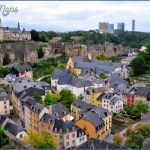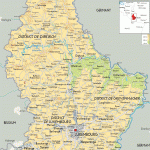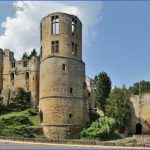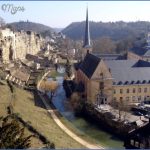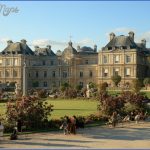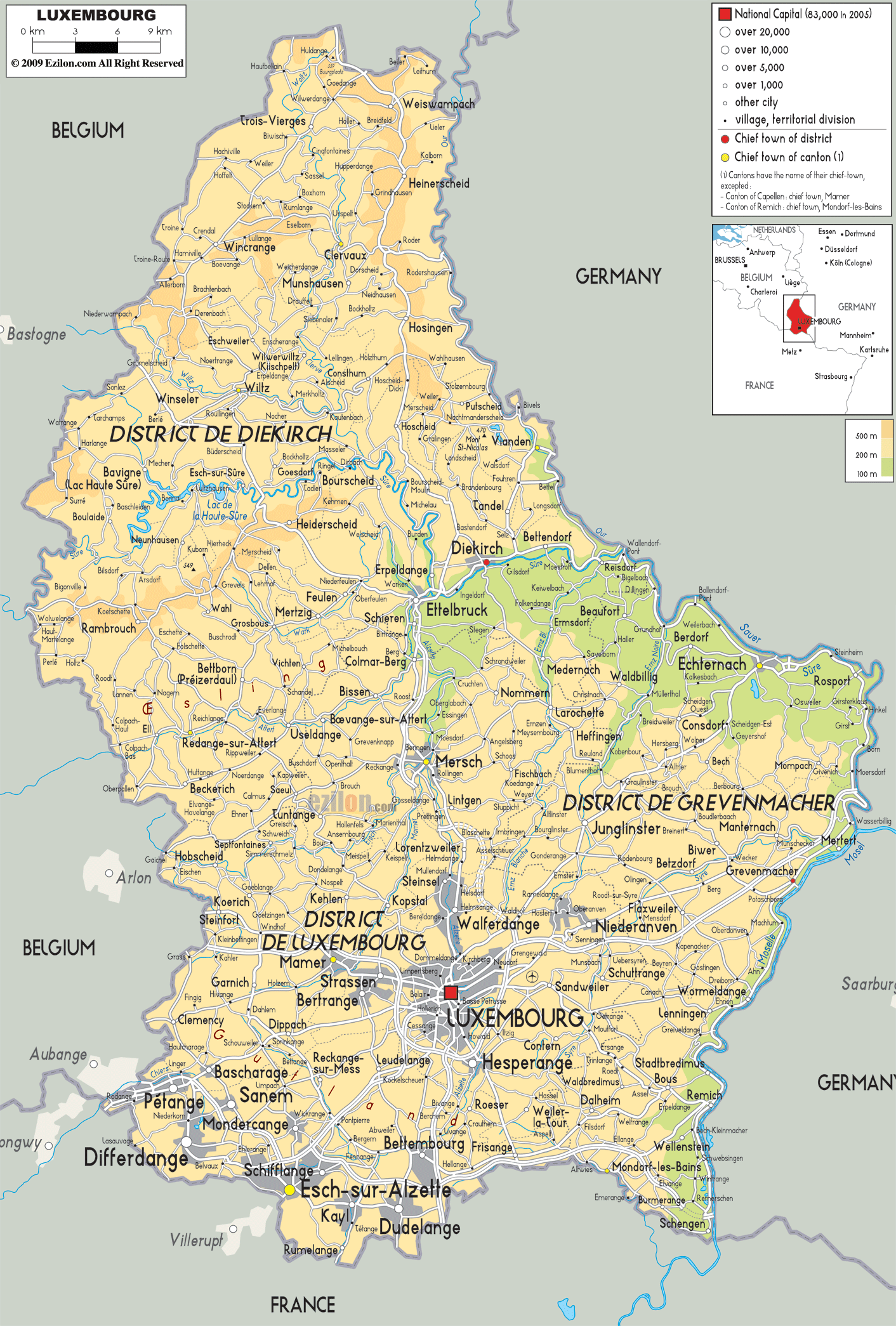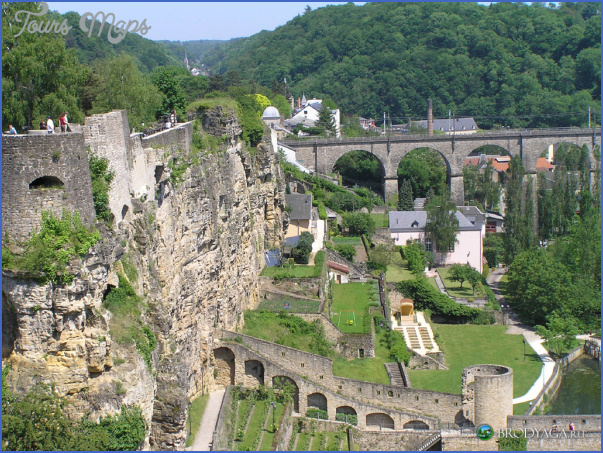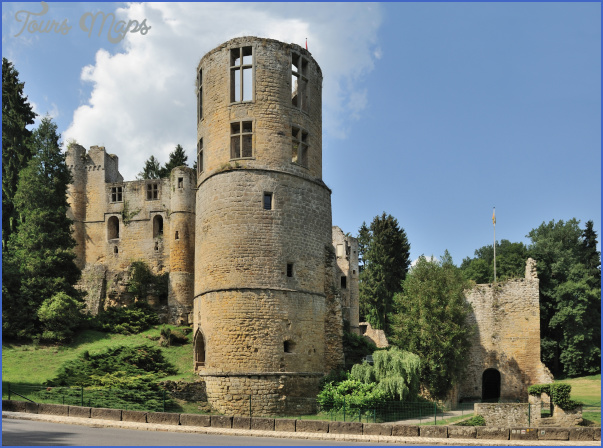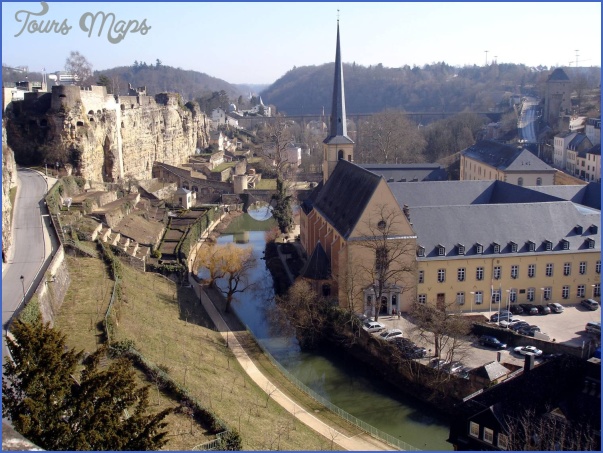LUXEMBOURG
Too often overlooked by budget travelers, the tiny Grand Duchy of Luxembourg boasts impressive fortresses and castles as well as beautiful hiking trails. Established in 963, the original territory was called Lucilinburhuc, named for the little fortresses that saturated the countryside after successive waves of Burgundians, Spaniards, French, Austrians, and Germans had receded. Today, Luxembourg has become a notable European Union member and a prominent international financial center. Judging by their national motto, Mir welle bleiwe wat mir sinn” (We want to remain what we are), it seems that the Luxembourgians are pleased with their accomplishments.
TODAY
Luxembourg is one of the world’s most industrialized countries, and it enjoys an economic security evidenced by the highest purchasing power and per capita income in Western Europe. The country is governed by a constitutional monarchy, in which the Grand Duke, currently Henri I, holds formal authority. The major executive and legislative power is vested in the prime minister, currently Jean-Claude Juncker, appointed by the Grand Duke, and in the Chamber of Deputies, elected by popular vote. Luxembourg has the greatest proportion of foreign residents of any Western European country. The Luxembourgian people have been significantly influenced by both German and French culture, but they maintain a distinct national identity.
WHEN TO GO
Anytime between May and mid-Oct. is a good time to visit. Luxembourg has a temperate climate with less rain than Belgium. Temperatures average 17°C (64°F) in summer, and 0°C (32°F) in winter.
DOCUMENTS & FORMALITIES
VISAS. EU citizens do not need a visa. Citizens of Australia, Canada, New Zealand, and the US do not need a visa for stays of up to 30 days. South Africans need a visa for stays of any length. Contact your embassy for more info.
EMBASSIES AND CONSULATES. All foreign embassies are in Luxembourg City (754). Embassies and consulates in other countries include: Australia, Level 18, Royal Exchange Bldg. 56 Pitt St. Sydney NSW 2000 ((02) 92 41 43 22; fax 92 51 11 13). Canada, 3706 St. Hubert St. Montreal, PQ H2L 4A3 ( 514-849-2101). South Africa, P.O. Box 357, Lanseria 1748 ((011) 659 09 61). UK, 27 Wilton Crescent, London SW1X 8SD ((020) 7235 6961; fax 7235 9734). US, 2200 Massachusetts Ave. NW, Washington, D.C. 20008 (202-265-4171; fax 328-8270).
TRANSPORTATION
BY PLANE. The Luxembourg City airport (LUX) is serviced by Luxair (479 81, reservations 4798 42 42) and by flights from the UK and throughout the continent. Cheap last-minute flights on Luxair are available at www.luxair.lu.
BY TRAIN AND BUS. A Benelux Tourrail Pass allows five days of unlimited train travel in a one-month period in Belgium, The Netherlands, and Luxembourg (47). The Billet Reseau (‚4.60, book of 5 ‚19), a network ticket, is good for one day of unlimited bus and train travel. Even better is the Luxembourg Card (757), which includes unlimited transportation. International train routes to Luxembourg include: Brussels (l%hr.; 122) and Liege (2V6hr.) in Belgium; Koblenz (2V4hr.; 485) and Trier (45min.; 486) in Germany.
BY BIKE AND THUMB. Hiking and biking trails run between Luxembourg City and Echtemach, from Diekirch to Echtemach and Vianden, and elsewhere. Bikes aren’t permitted on buses, but are allowed on many trains for free. Let’s Go does not recommend hitchhiking as a safe means of transport.
TOURIST OFFICES. For general info, contact the Luxembourg National Tourist Office, P.O. Box 1001, L-1010 Luxembourg ((352) 42 82 82 10; www.etat.lu tourism). The Luxembourg Card, available from Easter to October at tourist offices, hostels, and many hotels and public transportation offices, provides unlimited transportation on national trains and buses and includes admission to 40 tourist sites (1-day ‚9, 2-day ‚16, 3-day ‚22).
MONEY. On January 1, 2002, the euro (‚) replaced the Luxembourg Franc as the unit of currency in Luxembourg. The Luxembourg Franc can still be exchanged at a rate of 40LF to ‚1. For exchange rates and more info on the euro, see 14. The European Union imposes a value-added tax (VAT) on goods and services purchased within the EU (16). Luxembourg’s VAT (15%) is already included in most prices. Luxembourg’s refund threshold (US$85) is lower than most other EU countries; refunds are usually 13% of the purchase price. The cost of living in Luxembourg is moderate to high. Service (15-20%) is included in the price; tipping extra for exceptional service is optional. Tip taxi drivers 10%.
BUSINESS HOURS. Most banks are open M-F 8:30am-4:30pm, and most shops are open M-Sa 10am-6pm with shorter hours on Sunday. However, some banks and shops close at noon for two hours, especially in the countryside.
TELEPHONES. There are no city codes in Luxembourg; from outside the country, dial 352 plus the local number. Most public phones accept phone cards, which are sold at post offices and newspaper stands. Mobile phones are an increasingly popular and economical alternative to landlines (30). International direct dial numbers include: AT&T, 8002 0111; British Telecom, 0800 89 0352; Canada Direct, 800 2 0119; Ireland Direct, 0800 353; MCI, 8002 0112; Sprint, 0800 0115; Telecom New Zealand, 800 20064.
TOURIST SERVICES AND MONEY
MAIL. Mailing a postcard or a letter (up to 50g) within Luxembourg costs ‚0.59, within the EU ‚0.74, and to the rest of the world ‚1.12.
LANGUAGES. French and German are the administrative languages; since a referendum in 1984, Letzebuergesch, a mixture of the two that sounds a bit like Dutch, is the national language. French is most common in the city, while German is more common in smaller towns. English is commonly spoken as a second, third, or fourth language.
LUXEMBOURG Photo Gallery
Maybe You Like Them Too
- Explore Pulau Sebang Malaysia with this Detailed Map
- Explore Southgate, Michigan with this detailed map
- Explore Les Accates, France with this Detailed Map
- Explore Góra Kalwaria, Poland with this detailed map
- Explore Gumdag, Turkmenistan with this detailed map

